
Who or what the other is, I never know. But the other who is forever unknowable is the one who differs from me sexually. This feeling of surprise, astonishment, and wonder in the face of the unknowable ought to be returned to its locus: that of sexual difference. Thus Luce Irigaray undertakes a searching inquiry into what may be the philosophical problem of our age.
Irigaray approaches the question of sexual difference by looking at the ways in which thought and language--whether in philosophy, science, or psychoanalysis--are gendered. She juxtaposes evocative readings of classic texts, including Plato's Symposium, Aristotle's Physics, Descartes's On Wonder in The Passions of the Soul, Spinoza's Ethics, Merleau-Ponty's The Visible and the Invisible, and Levinas's Totality and Infinity, with meditations on experiences of love: between fetus and mother, between heterosexual lovers, between women, and between women and their own bodies.
Exploding traditional dualities such as inside/outside, form/content, subject/object, and self/other, Irigaray shows how an understanding of such experiences points to gender blindness in both classic and contemporary theory. Asserting that women have never known a love of self out of which a non-dominated love of the other is possible, Irigaray argues that only when women insist on the integrity of their own spaces of embodiment can love become the basis of a revolution in ethics.
Published in French in 1984, An Ethics of Sexual Difference is now available in English in a superb translation by Carolyn Burke and Gillian C. Gill. Readers interested in feminist theory, literary theory, and philosophy--indeed anyone deeply concerned with gender relations--will be challenged by the brilliance and boldness of Irigaray's analyses.







